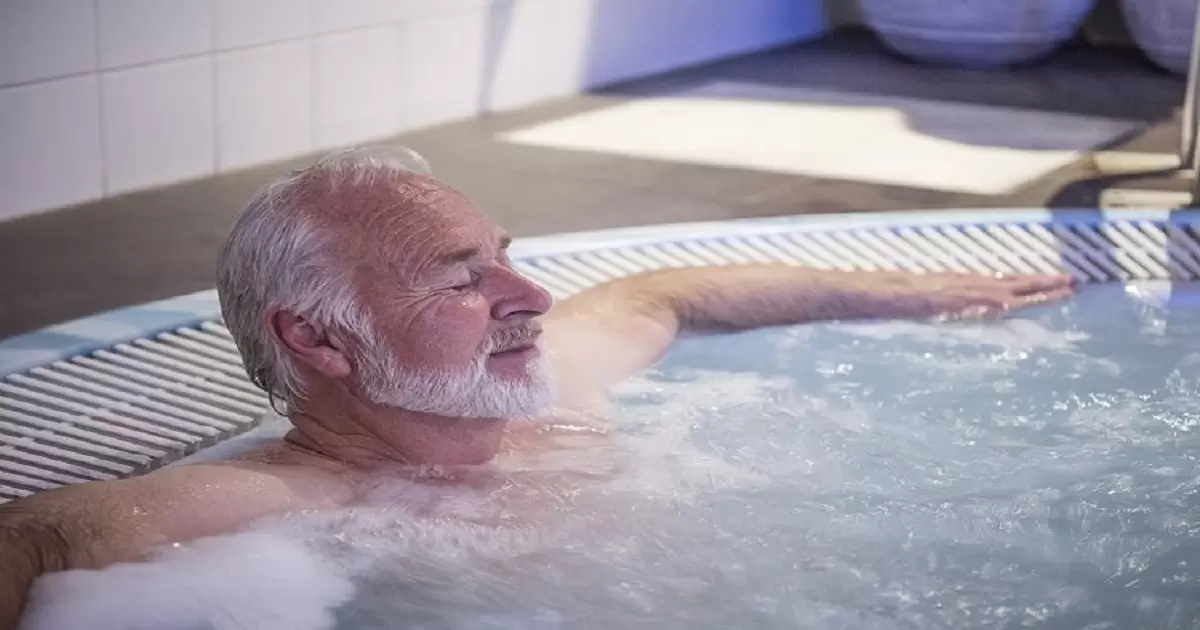Can you go in a jacuzzi with a pacemaker? Many people wonder if it’s safe to enjoy the soothing warmth of a jacuzzi while having a pacemaker. In this article, we’ll explore the considerations and precautions to take when using a hot tub with a pacemaker, ensuring your relaxation is worry-free.
Discover the hot topic: Can you go in a jacuzzi with a pacemaker? Your heart’s safety matters, and we’ve got the answers. Dive into our guide to ensure your relaxation is worry-free, and your pacemaker doesn’t skip a beat in the bubbling warmth of a jacuzzi.
Going in a jacuzzi with a pacemaker is a concern for some. A pacemaker helps regulate the heart’s rhythm. While most people with pacemakers can enjoy hot tubs safely, it’s essential to consult your doctor. They can assess your specific condition and ensure you take any necessary precautions to keep your heart in rhythm while you relax.
How Long Can You Stay In A Hot Tub With A Pacemaker?
Can you go in a jacuzzi with a pacemaker? Many wonder about the safety of staying in a hot tub with a pacemaker. The good news is that, in most cases, individuals with pacemakers can enjoy hot tubs. These devices are designed to be water-resistant and withstand various environmental conditions, including hot tubs. However, it’s essential to consult your doctor and follow specific guidelines.
The amount of time you can safely spend in a hot tub with a pacemaker largely depends on your individual health and your doctor’s recommendations. Typically, short sessions of 10-15 minutes with breaks to cool down are considered safe. Prolonged exposure to hot water can raise your body temperature and potentially affect your heart rate. To ensure a relaxing soak without compromising your heart health, always seek your healthcare provider’s advice and follow their guidelines for safe hot tub use with a pacemaker.
What Activities Can You Not Do With A Pacemaker?
While having a pacemaker can significantly improve one’s quality of life, certain activities may need to be approached with caution. Individuals with pacemakers should avoid exposing themselves to strong electromagnetic fields, which can interfere with the device’s functioning. Engaging in contact sports like boxing or martial arts, and activities involving intense upper body movements, should be done carefully to avoid any impact to the pacemaker.
Additionally, those with pacemakers should be mindful of certain water-related activities. While swimming is generally safe, precautions should be taken in an existing pool to prevent any accidental trauma to the pacemaker site during vigorous strokes. Activities like scuba diving or activities with a risk of sudden impacts, such as water skiing, should be approached with care and with the guidance of a healthcare professional to ensure the pacemaker remains undisturbed. Regular consultations with a healthcare provider can provide specific guidance on what activities are safe for an individual based on their unique health circumstances.
Who Should Not Use A Hot Tub?
Certain individuals should avoid using hot tubs to prevent any potential health risks. Those with heart disease, high or low blood pressure, or a history of fainting might be at risk due to the hot water’s effect on the cardiovascular system. Additionally, pregnant women should exercise caution, as excessive heat can harm the developing fetus. People with skin conditions or open wounds must be cautious to avoid infections, and those who are sensitive to chemicals should be wary of the hot tub’s water treatment products.
Furthermore, individuals with certain respiratory conditions, such as asthma, might find the hot and humid air exacerbating their symptoms. Moreover, those with a weakened immune system or recent surgeries should consult a healthcare professional before using a hot tub, as they might be more susceptible to infections or other complications. It’s crucial to prioritize one’s health and consult with a medical expert to determine whether using a hot tub is safe based on individual health conditions and needs.
Why Can’t People With Heart Problems Go In Hot Tubs?
People with heart problems may face limitations when it comes to using hot tubs. Hot tubs elevate your heart rate and body temperature. This can put additional strain on an already compromised cardiovascular system. For individuals with conditions like hypertension, congestive heart failure, or certain arrhythmias, the hot tub’s heat and the resulting increased heart rate can be risky. The potential for dehydration and low blood pressure due to hot tub use further complicates matters.
Moreover, hot tubs can lead to vasodilation, causing blood vessels to expand. For those with heart issues, this may reduce blood flow to vital organs and cause dizziness or fainting. If you have heart problems, it’s crucial to consult your healthcare provider before using a hot tub. They can offer tailored guidance to ensure your safety and help you make informed decisions about hot tub use based on your specific condition.

Does A Hot Tub Raise Your Heart Rate?
A hot tub can indeed raise your heart rate. When you immerse yourself in hot water, your body’s temperature rises. To cool down, your heart rate naturally increases. This is because your heart pumps more blood to the skin’s surface for heat dissipation. As a result, you may experience a slight increase in heart rate while enjoying a hot tub.
It’s important to note that the heart rate elevation in a hot tub is generally mild and temporary. For most people, it’s not a cause for concern. However, if you have a pre-existing heart condition or are taking medications that affect your heart rate, you should exercise caution and consult with a medical professional before using a hot tub. Being aware of your own health and any potential risks is key to safely enjoying the relaxation and warmth of a hot tub.
What Hot Tub Temperature Is Safe For Heart Patients?
For heart patients, determining the safe temperature for a hot tub is crucial. Most experts recommend keeping the water temperature below 104 degrees Fahrenheit (40 degrees Celsius). Prolonged exposure to higher temperatures can strain the cardiovascular system, potentially raising blood pressure and heart rate.
While a warm soak can be relaxing and even therapeutic, it’s essential for heart patients to consult their healthcare provider before using a hot tub. Doctors can provide personalized guidance based on an individual’s specific condition and overall health. Factors such as the type of heart condition, medications, and overall physical fitness play a role in determining the optimal temperature and duration for hot tub use. When in doubt, it’s better to err on the side of caution and follow medical advice to ensure a safe and enjoyable hot tub experience that promotes cardiovascular well-being.
| Topic | Key Points |
| Introduction | – The question: “Can you go in a jacuzzi with a pacemaker?” |
| – Importance of understanding the safety concerns | |
| Safety Considerations | – Discussing the role of a pacemaker in heart regulation |
| – Advising temperature limits for hot tubs | |
| – Risks of elevated water temperature for heart patients | |
| Precautions | – The need for consulting a healthcare provider |
| – Individualized guidance based on the heart condition | |
| Expert Opinions | – Sharing expert perspectives on the topic |
| Conclusion | – Summarizing the main points |
| – Emphasizing the importance of consulting a doctor | |
| – Providing a clear answer to the initial question | |
| Additional Resources | – Links to further information or medical guidelines |
| Reader Takeaway | – The key message: Safety first when combining pacemakers and jacuzzis |
FAQs
What is the age limit for a pacemaker?
There is no specific age limit for receiving a pacemaker. The decision to implant one is based on an individual’s medical condition and need, rather than their age.
How long can a 90 year old live with a pacemaker?
The lifespan of a 90-year-old with a pacemaker varies, but modern pacemakers can last 10-15 years. Many people continue to live active, fulfilling lives with proper care and regular follow-up with their healthcare provider.
Can a person live a full life with a pacemaker?
Yes, many people with pacemakers live full and active lives. Pacemakers help regulate heart rhythms and are well-tolerated, allowing individuals to engage in a wide range of activities while ensuring their hearts function optimally.
How many times pacemaker can be replaced?
Pacemakers can typically be replaced multiple times as needed throughout a person’s life. The frequency of replacements depends on factors like battery life, device malfunction, and the individual’s health condition.
Who is not a good candidate for a pacemaker?
Patients with reversible causes of slow heart rate or those who do not experience symptoms from their slow heart rate are typically not good candidates for a pacemaker. The decision to implant a pacemaker depends on the individual’s specific medical condition and symptoms.
Conclusion
Using a jacuzzi with a pacemaker is generally safe for most individuals, but it’s essential to exercise caution and seek medical guidance. While a pacemaker can help regulate the heart’s rhythm, hot tubs can pose some risks due to the elevated water temperature. Before taking the plunge into a jacuzzi, consult your healthcare provider to ensure it won’t adversely affect your specific heart condition. They can offer personalized advice and recommend a safe water temperature and duration for your relaxation.
Remember, everyone’s situation is unique, and what’s suitable for one person may not be ideal for another. Your healthcare provider can assess your individual needs. Making sure you can enjoy the soothing waters without compromising your heart’s health. With their guidance, you can strike the right balance between relaxation and safety.Ensuring that your time in the jacuzzi is both enjoyable and beneficial for your well-being. So, if you’re wondering, Can you go in a jacuzzi with a pacemaker? the answer is often yes, but always consult your doctor to be sure.








